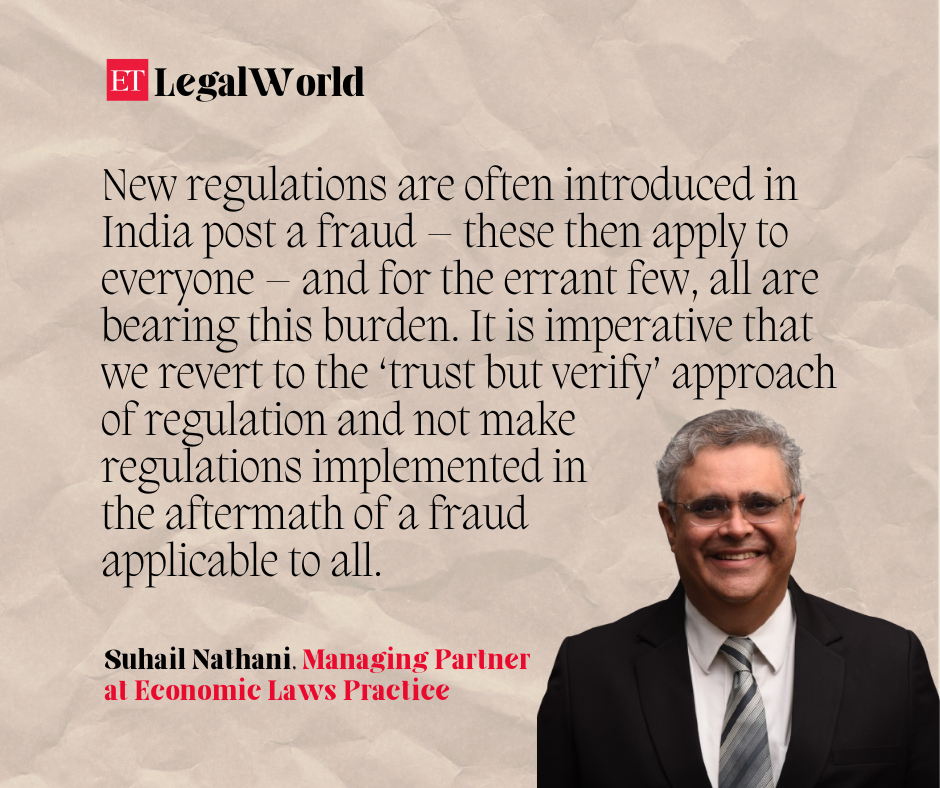Highlights
- The Economic Survey 2024-25 emphasizes the necessity of deregulation to enhance India’s global competitiveness, advocating for simplified regulations to lower the cost of doing business and stimulate economic growth.
- Suhail Nathani, Managing Partner at Economic Laws Practice, stresses that reducing excessive regulatory burdens will not only promote economic freedom but also catalyze innovation and employment generation in the rapidly evolving global economy.
The Economic Survey 2024-25, tabled in Parliament today, emphasizes the critical role of deregulation in accelerating economic growth and employment generation amidst prevailing global challenges.
The survey advocates for simplifying regulations and reducing compliance burdens to lower the cost of doing business in India.”Over-regulation is the bane on Indian enterprises. From ‘trust but verify’ over the past few years, in India we have now transitioned to ‘verify then trust’,” said Suhail Nathani, Managing Partner at Economic Laws Practice.
Highlighting the need for a multi-pronged approach, the survey acknowledges that while deregulation is crucial in many areas, strategic regulatory interventions may still be necessary in certain sectors. It stresses that improving India’s global competitiveness requires structural reforms and deregulation at the grassroots level to bolster medium-term growth prospects.
The survey’s central theme revolves around enhancing investment efficiency through deregulation and ‘Ease of Doing Business.’ It argues that by streamlining regulations, India can optimize existing investments and unlock new growth opportunities. Most chapters of the survey delve into specific regulations and propose deregulation measures to achieve this objective.
To ensure the success of these structural reforms, the survey calls for accelerating and expanding the deregulation agenda initiated over the past decade. It emphasizes the importance of restoring people’s agency and promoting economic freedoms for individuals and organizations.
The survey underscores that unleashing India’s domestic-led growth potential necessitates assessing the true cost of regulations, implementing systematic deregulation to reduce these costs, and formulating policies that alleviate the burden of economic activities for both citizens and businesses.”With multiple agencies having overlapping jurisdiction, the need of the hour is simplification of compliances and light touch regulation. Technology has made it virtually impossible for honest enterprises to de-fraud the system,” said Suhail Nathani, Managing Partner at Economic Laws Practice.
Further, advocating for policy actions that enhance economic freedom, enables individuals to pursue legitimate economic and entrepreneurial aspirations without hindrance.

The survey acknowledges the government’s efforts in deregulation through process and governance reforms, simplification of taxation laws, rationalization of labor regulations, and decriminalization of business laws. It also recognizes the active participation of states in reducing compliance burdens, simplifying processes, and engaging with businesses to identify pain points.
The survey emphasizes the need for rationalizing regulations to ensure they are minimally necessary and maximally feasible for small and medium enterprises. It asserts that the focus of reforms and economic policy should now be on systematic deregulation.”The fundamental change required is that at some point the onus of the burden needs to change to the regulator. Further, where a court of the level of the high court has opined on an issue – whether appealed or not, the regulator must stay its hand rather than filing and pursuing additional appeals until the case is finally decided. They may file an appeal for purposes of limitation but not pursue the same,” Suhail Nathani added.
The call for enhancing economic freedom through deregulation gains renewed importance in today’s rapidly evolving global economy. Over-regulation stifles innovation and economic dynamism, creating barriers to entry, reducing competition, and slowing innovation. By reducing excessive regulatory burdens, governments can help businesses become more efficient, reduce costs, and unlock new growth opportunities. Strategic and systematic deregulation can catalyze growth, innovation, and competitiveness.
The survey concludes that deregulation, including labor-related reforms, will boost employment by lowering the cost of doing business and enabling resources to be used for expanding capacity through increased labor and improved equipment.
The Union Budget 2025 will be presented on February 1. The Economic Survey was released on January 31. The first part of the Budget session will conclude on February 13. The session will reconvene on March 10 and continue till April 4.


